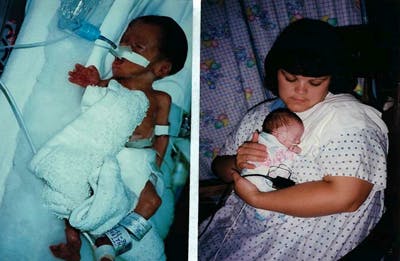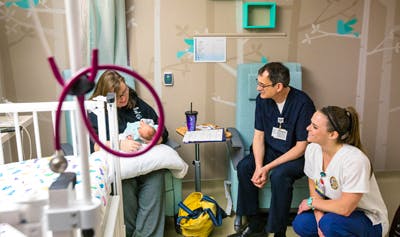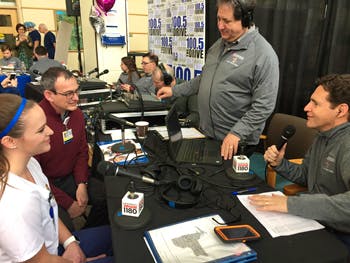Coming Full Circle
By Jim Legg
Friday, October 6, 2017
Her unique beginnings and an unlikely reunion inspire ‘miracle baby’ Raleigh Galbraith on her road back to the NICU
Raleigh Galbraith smiles down at three-week-old Ava as her professor shows her how to best listen to the preemie’s tiny heart. He sanitizes his hands one more time, grabs the miniature stethoscope from the side of the crib, and gently adjusts the 4-pound baby’s onesie.
“Sometimes, I close my eyes when I’m doing this, so that I’m really able to focus on the sounds and not everything else that’s going on around me,” explains Patrick Hopkins, DNP, APRN, C-PNP, NNP, assistant professor of clinical nursing and co-director of the University of Rochester’s accelerated program for non-nurses.
Galbraith nods, absorbing one more piece of information on her way to becoming a nurse. She glances over at the baby’s mom to give her a reassuring smile — a habit she likely picked up from observing experienced nurses like Hopkins, who has worked in the NICU for more than two decades.
Ava’s visit from Hopkins and Galbraith in the neonatal intensive care unit at Strong Memorial Hospital is a happy one. She sleeps through the poking and prodding; a few days later she will be sent home. Hopkins and Galbraith have been in the NICU together before under much more worrisome circumstances.
In fact, they met each other there for the first time 23 years ago.
A Tale of Two Birthdays
Amy Galbraith was just over 24 weeks pregnant with twins in 1994 when she began having contractions and was rushed to the hospital. Daughter Alex was born a few hours later, weighing 1 pound, 4 ounces. She wasn’t breathing, and doctors told her parents that she needed open heart surgery.
As Amy and her husband, John, watched doctors and nurses hook their tiny baby girl up to a ventilator and rush her to the operating room, they were fraught with worry — both for Alex, and for her unborn twin.
“We were told that if our other daughter was able to stay in utero for a few more days, it would help her develop more, and that her lungs would be more mature,” said Amy. “But I was upset and stressed, and we weren’t sure what was going to happen.”

Alex’s heart surgery was successful, and two-and-a-half days later, Raleigh was born. Those two extra days made a difference. Raleigh weighed slightly more than her sister, and she had a stronger heart and lungs.
But the twins’ fight for their lives was far from over. In 1994, the survival rate for babies born at 24 weeks hovered around 40 percent. As twins with low birth weights, Alex and Raleigh’s odds were even worse.
“The doctors were honest with my parents, and they told them our chances weren’t good,” said Raleigh. “They told my parents that we probably wouldn’t make it.”
But Alex and Raleigh proved them wrong. As the weeks passed, the twins gained weight, and their health began to improve. After three months in in the NICU, Raleigh was able to go home. Alex joined her a few months later.
Next came the TV news stories and the front-page newspaper articles. The sisters were called miracle babies. They had defied the odds, and they had a unique claim to fame — twins born 60 hours apart.
Returning to the NICU
As twins, Raleigh and Alex grew up sharing almost everything. But they relished having one thing all to themselves — their birthdays.
Every year in May, the girls’ two separate celebrations are meaningful reminders of the odds they overcame. So to Amy, bringing her daughters back to the NICU seemed like an appropriate way to mark the occasion.
“I wanted them to see where they’d come from, and hopefully, to meet some of the people who helped save their lives,” said Amy
When Raleigh walked into the NICU for the first time on her 12th birthday, she was overwhelmed. She wasn’t expecting that the babies would be so small, and she couldn’t believe that she was once that tiny.
But it wasn’t long before Raleigh felt in her element. Even at that young age, the role of caretaker came naturally to her.
“As we were walking around the NICU, I saw a grandmother who was watching over her newborn grandson. She was visibly upset, and I felt like she needed to hear our story,” she said. “I went over and told her what had happened to us, and she could see that we were both OK. Immediately, her expression changed from fear to hope.”
At that moment, Raleigh knew that she wanted to be a nurse.
“That experience showed me that taking 10 minutes of out my day to talk to someone could make a difference in their life,” said Raleigh. “I wanted to be able to be the person who would help patients and families through those difficult moments, and I knew nursing would allow me to do that.”
Ten years later, Raleigh’s first choice was the UR School of Nursing. Some of her college classmates warned her that the accelerated program was too competitive, and that she might not get in.
But Raleigh is accustomed to proving people wrong. She’s been doing it since she was born.
“I just knew this was the place I wanted to be,” she said. “When I got that call from the school that had been accepted, I fell on the floor crying.”
An Unexpected Reunion
Just one day after graduating from the University at Buffalo with her bachelor’s degree in health and human services, Raleigh started nursing school.
On the first day of orientation, it’s a tradition for the new student nurses to pair up, spend 10 minutes getting to know each other, and introduce their partner to the rest of the class. The directors of the program encourage the students to share fun facts about themselves — maybe a quirky hobby or a unique talent.
Raleigh didn’t have to think very hard to come up with an appropriate tidbit about herself.
“When it was our turn, my partner told the class that I was a twin, born two-and-a-half days after my sister,” said Raleigh.
The story seemed uncannily familiar to Hopkins, who asked Raleigh if she was born in Rochester.
“When she said yes, I knew I was one of the nurses who helped care for her,” he said.
So, in front of all of Raleigh’s classmates, Hopkins told her that he had changed her diapers.
“The class burst out laughing, and I blushed and thought, well, everyone knows who I am now!” said Raleigh. “I had goosebumps when I realized we had that connection. I had no idea.”
Hopkins has cared for hundreds and hundreds of premature babies, and the details of each one have faded over the years. But Raleigh’s story is one that has stuck with him.
--APNN student Raleigh Galbraith
“I was drawn to a career in the NICU because I knew the role would allow me to have an impact on babies’ lives that would last their whole lifetime,” said Hopkins. “It’s always rewarding to reunite with a patient I cared for and see that they are thriving, but meeting Raleigh was especially fulfilling. She is doing so well, despite the fact that the odds were so stacked against her and Alex.”
Twenty-two years after Hopkins cared for Raleigh in the NICU, he was her professor for her first class of nursing school.
“To me, that was just incredibly cool and inspiring,” said Raleigh. “I got to learn from one of the people who helped save my life, and I’m still learning from him every day.”
Fulfilling Her Destiny
In a few months, Raleigh is expected to graduate from nursing school and achieve the goal she set when she was 12 years old. Now, she has a new goal — to work as a nurse in the NICU alongside Hopkins and others who cared for her.
“Nursing to me is not only a career, but something I believe I was saved to do,” she said.
“I feel that as a NICU graduate, it’s important for me to do what I can to raise awareness about what goes on in the hospital every day.”
So when Raleigh was asked to speak at the ribbon cutting for Golisano Children’s Hospital’s renovated NICU, she enthusiastically agreed. During her speech, she recounted her first visit back to the unit on her 12th birthday. She talked about the baby boy she saw, the grandmother she comforted, and how the experience motivated her to pursue nursing.
Much like the reaction Hopkins had on Raleigh’s first day of nursing school, one woman in the audience knew she had heard that story before. She remembered hearing it from her mother 10 years ago, when her newborn son was in the NICU.
“After my speech, a mom came up to me with her son, and she told me that he was the baby boy I saw in the NICU that day. Her mother was the grandmother I spoke to. It was just the weirdest thing,” said Raleigh. “Now, I finally have an answer to what happened to him, and I know that he’s OK.
“That’s the kind of moment I want to have again. I want to comfort someone in their weakest moments of life, and to see them, years later, and know I had an impact on them.”
This story is also featured in the Spring 2017 NURSING magazine.
Categories: Accelerated Programs



